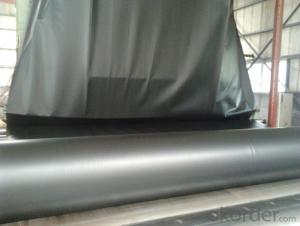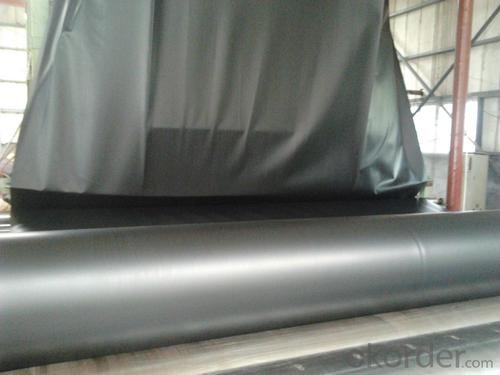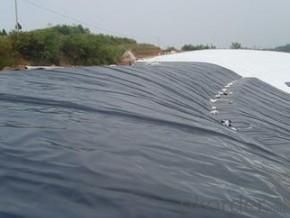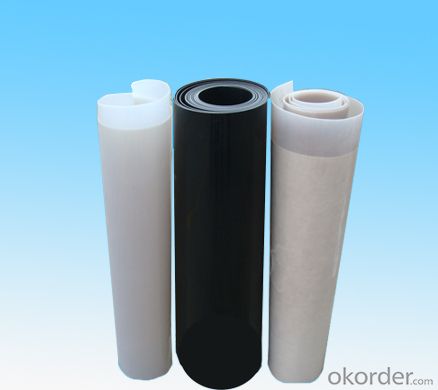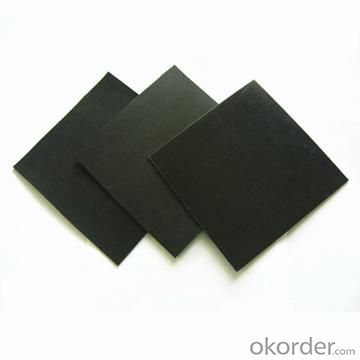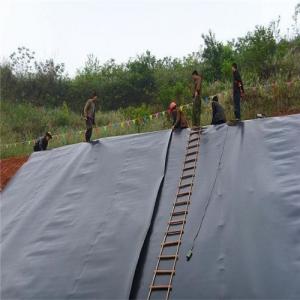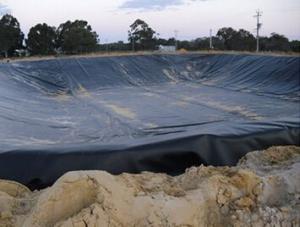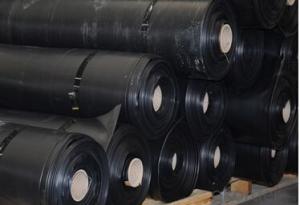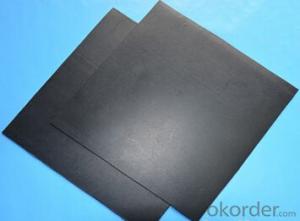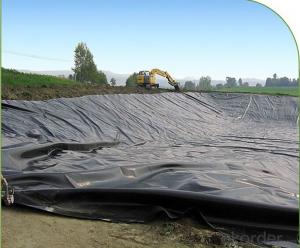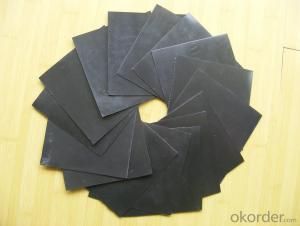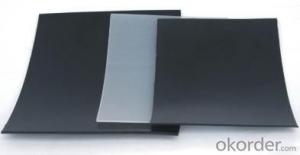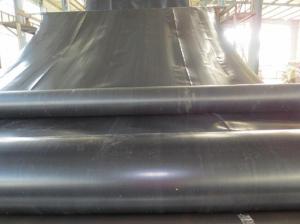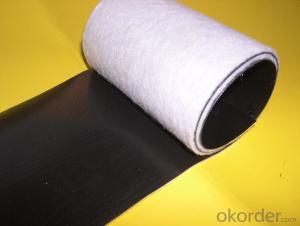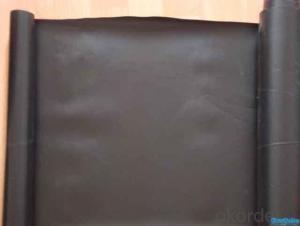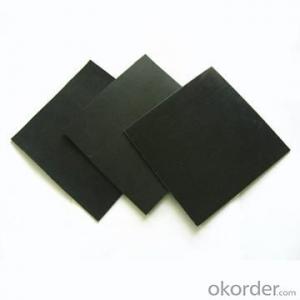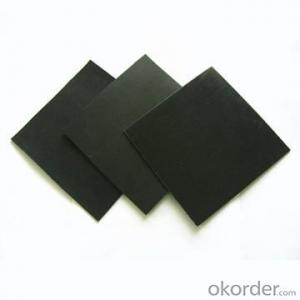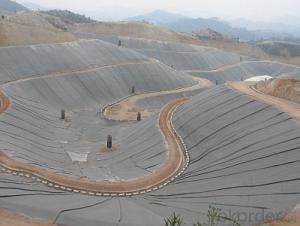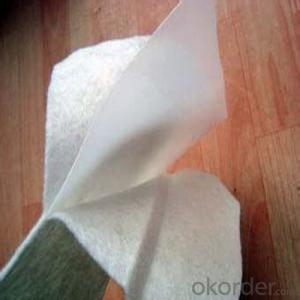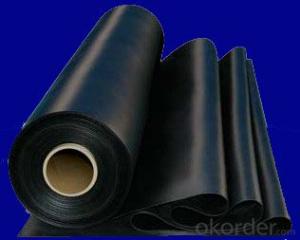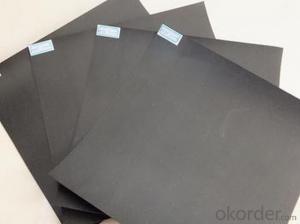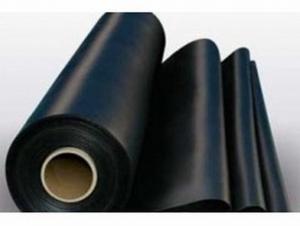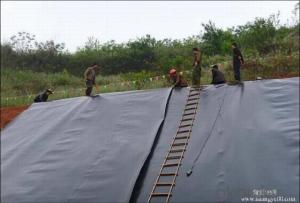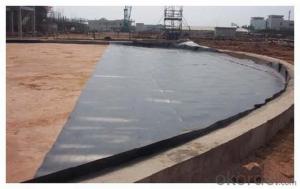Polyethylene Geomembrane Fish Farm Pond Liner with Black/White for Pond
- Loading Port:
- Qingdao
- Payment Terms:
- TT OR LC
- Min Order Qty:
- 10000 m²
- Supply Capability:
- 500000 m²/month
OKorder Service Pledge
OKorder Financial Service
You Might Also Like
Structure of Fish Farm Pond Liner
Fish Farm Pond Liner are made from polyethylene polymer materials that blow molding,its main function is to prevent the liquid leakage and gas volatile.According to the production of raw materials can divide into HDPE geomembrane liner and EVA geomembrane liner,etc.
Main Features of Fish Farm Pond Liner:
Complete variety of specifications of width and thickness. Thickness: 0.08-2mm/Width: 2-16m .
Excellent environmental stress resistant cracking performance.
Excellent performance of chemical erosion resistance.
Big scope of application temperature and long service life .
Applied in landfill waste site, sewage and filth treatment site, tailings depot and underground construction project
Fish Farm Pond Liner Images
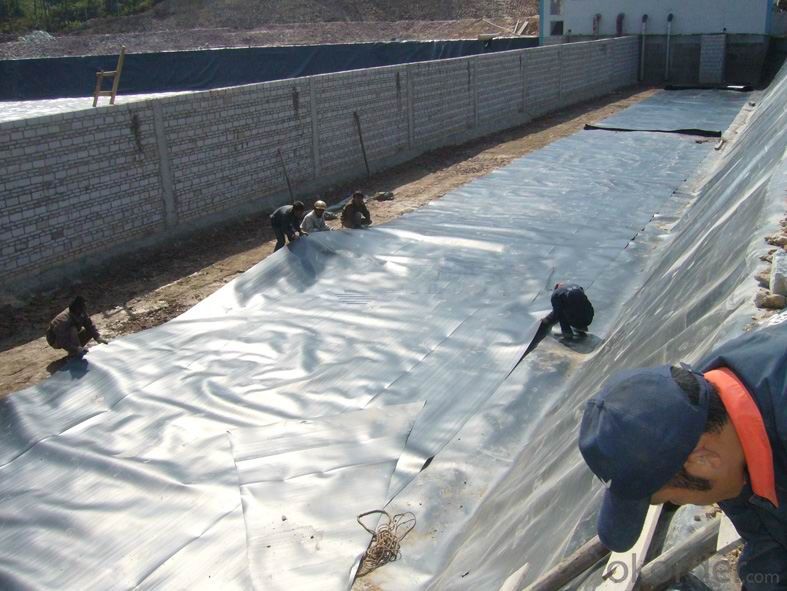
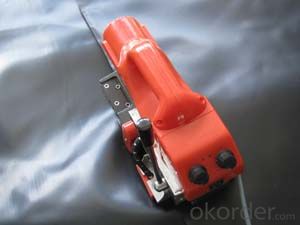
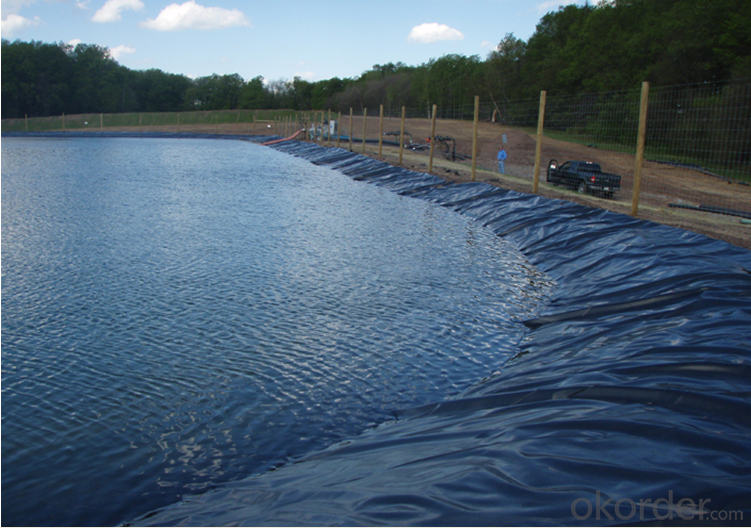
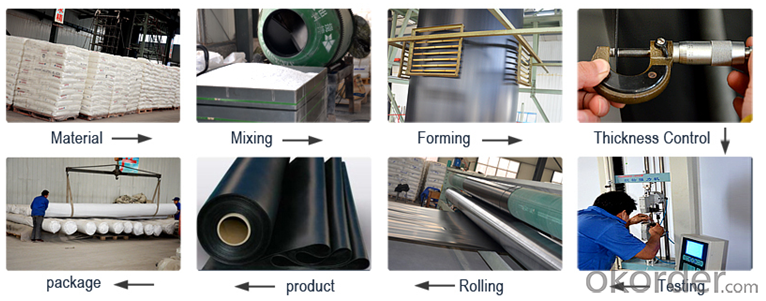
Fish Farm Pond Liner Specification :
No. | Item | Test Value | |||||||
0.75mm | 1.0 mm | 1.25 mm | 1.5 mm | 1.8mm | 2.0mm | 2.5 mm | 3.0mm | ||
1 | Minimum Density(g/cm³) | 0.94 | |||||||
2 | Strength at yield,N/mm | 11 | 15 | 18 | 23 | 27 | 30 | 38 | 45 |
3 | Strength at break ,N/mm | 21 | 28 | 33 | 43 | 51 | 57 | 71 | 85 |
4 | Elongation at yield,% | 13 | |||||||
5 | Elongation at break,% | 700min | |||||||
6 | Tear Resistance N | 93 | 125 | 156 | 187 | 219 | 249 | 311 | 373 |
7 | Puncture Resistance N | 263 | 352 | 440 | 530 | 618 | 703 | 881 | 1059 |
8 | Stress Crack Resistance, hrs | 400 | |||||||
9 | Carbon Black Content, % | 2.0-3.0 | |||||||
Carbon Black Dispersion | 1 or 2 | ||||||||
10 | Standard OTI Min | 100 | |||||||
High Pressure OTI Min | 400 | ||||||||
11 | Impact Cold Crack at -70°C | Pass | |||||||
12 | Water vapor permeability (g.cm/cm2 .s.Pa) | ≤1.0×10-13 | |||||||
13 | Dimensional Stability (%) | ±2 | |||||||
FAQ:
1. How about the delivery time?
Two weeks upon receipt of down payment.
2. What kind of payments do we accepted?
T/T, L/C, WesternUnion, MoneyGram.
3. What's are the MOQ?
Normally the MOQ is 5000 SQM in theory.
And we can provide you free samples for quality inspection.
4. Do you charge for the samples?
Accordeing to our company policy, the samples are freee, we only charge the freight fee. And we will return the freight fee in your second order.
5. Can you produce the product according to customers' requirements?
Sure, we are professional manufacturer, OEM and ODM are both welcome
- Q: How do geomembranes contribute to erosion control in riverbank stabilization?
- Geomembranes contribute to erosion control in riverbank stabilization by providing a barrier that prevents the soil from being washed away by water currents. They act as a protective layer that prevents erosion and helps stabilize the riverbank by reducing the impact of water flow and preventing the soil from being displaced. Additionally, geomembranes can also help in reinforcing the riverbank, providing structural stability and minimizing the risk of further erosion.
- Q: Principle of energy saving insulation film?
- Energy-saving insulation film maintains a constant indoor temperature by preventing the indoor and outdoor thermal convection. in summer when the outdoor temperature is higher than the indoor, energy-saving insulation film keeps the heat outside, keeping cooling inside; in winter, when outdoor temperature is lower than indoor temperature, saving insulation film prevent cold outdoor from entering indoor, and retain heat generated inside. the indoor temperature is not affected by the outdoor temperature.
- Q: What are the differences of geotextiles and geogrids?
- Geotextiles are used to prevent seepage. Geogrids are excellent geosynthetics used to reinforce roadbeds and soft grounds. Glass fiber geogrids are semi-rigid products made from high strength alkali free glass fiber. These raw materials are processed into gridlike base materials by international advanced warp knitting craft. Then the base materials are processed into finished products by surface coating treatment. They have high strength of extension and low elongation in the transverse and longitudinal directions and other excellent properties including high and low temperature resistance, aging resistance and corrosion resistance. They are widely used to protect and control desertification and reinforece railroad beds, dams, revetments, runways and pavements. Geotextiles are geosynthetics with water?permeability made from synthetic fiber by needle punching or weaving. The finished products are generally 4-6m wide and 50-100m long. Geotextiles can be divided into two categories, namely the woven geotextile and non-woven geotextile. Geotextiles perform well in the field of filtration, dewatering, separation, reinforcement and seepage control with properties of good protective effect, light weight, strong strength of extension, good permeability, high temperature resistance, freezing resistance, aging resistance and corrosion resistance. Geotextiles are geosynthetics. Applications of geosynthetics can date back to the nineteen fifties.
- Q: What are the advantages of using geomembranes in floating baffles?
- There are several advantages of using geomembranes in floating baffles. Firstly, geomembranes provide excellent durability and strength, making them highly resistant to punctures and tears. This ensures that the floating baffles maintain their structural integrity and effectiveness over time. Secondly, geomembranes are impermeable, meaning they prevent the passage of liquids and gases. This is crucial in floating baffles as it helps to contain and control the flow of water or other fluids within the desired areas. It also prevents the unwanted mixing of different fluids or contaminants, enhancing the overall effectiveness of the baffles. Additionally, geomembranes are flexible and adaptable, allowing them to conform to various shapes and sizes. This makes them ideal for floating baffles, as they can easily be customized to fit specific requirements and configurations. This flexibility also enables easy installation and maintenance of the baffles. Furthermore, geomembranes are resistant to UV rays, chemicals, and environmental degradation, ensuring their longevity and reliability in harsh conditions. This makes them suitable for floating baffles used in a wide range of applications, including wastewater treatment, pond and lagoon management, and oil spill containment. Overall, the advantages of using geomembranes in floating baffles include durability, impermeability, adaptability, and resistance to various environmental factors. These qualities contribute to the effectiveness and longevity of the baffles, making them a reliable solution for fluid containment and control.
- Q: what's the distinguish between geomembrane and waterproof board?
- Basements and tunnels; tailing dam, rockfill dam; waste storage; construction cofferdam; m2-800g & # 47; channels: Membrane thickness from 0: anti-seepage, isolation purposes, waste water reservoir dam and reservoir area, tunnel anti-seepage lining: Geotechnical dam, highway: 4-6-meter: Two cloth one membrane (both sides of the impermeable membrane are added with protective geotextile) one cloth one membrane (one side of impermeable membrane is added with protective geotextile) width, railroad embankment .8mm protective layer of geotextile from 100g & # 47.2mm - 0; roadbed and other foundation saline control, masonry dam and concrete dam development pressure; leakproof roofing product features; roads, Khouang); dike, reservoir tank (pit; underground; expansive soil and collapsible loess waterproof layer, dam levels impervious blanket, ground vertical impermeable layer
- Q: How do geomembranes help in preventing land subsidence?
- Geomembranes help in preventing land subsidence by acting as a barrier to limit the migration of water or other fluids into the soil. This prevents saturation and maintains the stability of the soil, reducing the risk of subsidence. Additionally, geomembranes can also be used to control the flow of groundwater, preventing excessive groundwater withdrawals that can contribute to land subsidence.
- Q: Should geotextile be laid under the geomembrane in the fish or shrimp ponds?
- It is unnecessary. You are wasting your money if you buy it. However, it still depends on the brand of the geomembrane you bought.
- Q: Are hdpe anti-seepage film and geomembrane the same?
- It is widely used in many industries such as tunnel, so it is a kind of good environmental protection material. I'm sorry I can't provide. The treatment of petrifaction tailings and water?conservancy hydroelectricity. As for HDPE anti-seepage film itself, it belongs to one kind of geomembranes. The definition of geomembrane is vague because of its chemical performance. HDPE film is the product of petroleum chemical engineering. There are also many geomembranes made from other materials. The anti-seepage engineering involves refuse landfill. As for construction scheme. Currently in the country. There are little categories of geomembrane. It can't react to plenty of chemical constituents. Besides, there are LDPE film and municipal administration principle. Composite geomembrane is mainly used in anti-seepage engineering industry.
- Q: What are the considerations for geomembrane installations in areas with high snow loads?
- When installing geomembranes in areas with high snow loads, several considerations need to be taken into account. Firstly, the geomembrane material should be selected carefully to ensure it can withstand the weight and pressure of the accumulated snow. Thicker materials or those with higher tensile strength are often preferred in such areas. The design of the geomembrane installation should also incorporate measures to prevent snow accumulation or mitigate its effects. This may include implementing a slope or using mechanical devices like snow fences to redirect or trap the snow away from the geomembrane. Proper anchoring and fastening techniques are crucial to ensure the geomembrane remains securely in place, even under the weight of heavy snow. Adequate tensioning and anchoring systems should be used to prevent any displacement or damage to the geomembrane. Regular inspection and maintenance of the geomembrane are essential in areas with high snow loads. This helps identify any potential issues, such as tears, punctures, or excessive stretching, and allows for timely repairs or adjustments to be made. Lastly, it is vital to consider the impact of snowmelt on the geomembrane system. Proper drainage and runoff management should be incorporated into the design to prevent the accumulation of water on the geomembrane surface, which could lead to additional stress or damage. Overall, careful material selection, proper design, secure installation, regular maintenance, and effective drainage are key considerations for geomembrane installations in areas with high snow loads.
- Q: what's the pneumatic membrane valve mechanism?
- the pneumatic membrane valve mechanism are as follow: Pneumatic diaphragm control valve by the pneumatic membrane actuator mechanism and a valve body is composed of two parts, body structure is generally straight stroke type, the common part are single seater, two seater, sleeve, angle, three links, skateboarding, diaphragm structure. it is mainly by the valve cover, valve core, valve seat, valve stem, stuffing box, etc.. Upper end of the valve rod and thin film institutions push rod connected to the lower end, putting drives the valve rod to move, so that spool movement, changing the flow of fluid between the spool and the valve seat area, thus changing the flow of the fluid, to achieve the purpose of regulating.
Send your message to us
Polyethylene Geomembrane Fish Farm Pond Liner with Black/White for Pond
- Loading Port:
- Qingdao
- Payment Terms:
- TT OR LC
- Min Order Qty:
- 10000 m²
- Supply Capability:
- 500000 m²/month
OKorder Service Pledge
OKorder Financial Service
Similar products
Hot products
Hot Searches
Related keywords
